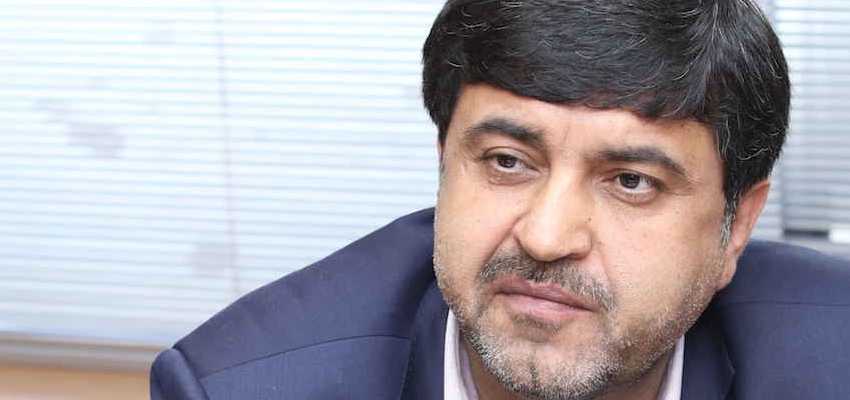Tuesday 23 October 2018 - 15:37
Story Code : 324319
Parsian Bank CEO: US Treasury made ĎMistakeí in Iran sanctions designation
On October 16, the US Treasury Office of Foreign Assets Control (OFAC) designated twenty Iranian entities as SDGTs for allegedly providing support to Bonyad Taavon Basij, a holding company associated with Iranís Basij paramilitary force. Several banks and financial institutions were among the targeted entitiesóthe most prominent among them was Parsian Bank, a private sector financial institution.
Parsian was designated "for assisting, sponsoring, or providing financial, material, or technological support for, or financial or other services to or in support of, Andisheh Mehvaran Investment Company", itself one of several intermediaries ultimately linked back to Bonyad Taavon Basij.
The designation of Parsian seemed to confirm growing concerns that the Trump administration intends to target Iranian banks previously exempt from secondary sanctions as part of its ďmaximum pressureĒ policy on Iran.
According to Parsian Bankís CEO, Kourosh Parvizian, US authorities have exaggerated a financial link in order to designate the bank. "Parsian was sanctioned because one company, Andisheh Mevaran, bought and sold less than 0.3 percent of the total shares of the bank in the stock market," Parvizian told Bourse & Bazaar, adding that such a small shareholder would have no influence over the management or operations of the bank, meaning that any financial link fell well below OFACís typical concern with the ďcontrolĒ of Iranian companies by sanctioned entities.
The number of shares purchased by Andisheh Mehvaran even falls below the normal threshold for regulatory oversight by the Central Bank of Iran. The markets regulator only requires approval for share purchases when real or legal persons are seeking to purchase more than 5 or 10 percent of the firm's total outstanding shares respectively. Parsian Bank has 23.7 billion shares currently outstanding on the Tehran Stock Exchange and counts over 70,000 shareholders.
By either deliberately or negligently misconstruing the bank as beholden to Andisheh Mehvaran, US treasury officials made a ďmistake at the expense of over 70,000 shareholders and 6.5 million customers of a bank that handles the transactions behind the majority of imports of foodstuffs, medicine and other humanitarian trade items for the Iranian people," Parvizian said.
The belief that Parsian Bankís designation is a result of a "mistake" runs counter to the views of many sanctions attorneys, who believe that the Trump administration is trying to send signal of zero-tolerance to Iranians banks and their international partners.
Adam Smith, of law firm Gibson Dunn & Crutcher, told the Wall Street Journalís Samuel Rubenfeld that the designation of Parsian Bank ďwill make it more difficult to get financing for humanitarian projects.Ē Smith, a former Treasury Department official, is ďvery nervousĒ about how a more hardline sanctions policy from the Trump administration could impact humanitarian trade.
Iran's Foreign Minister Javad Zarif seemingly agrees that the designation of Parsian Bank was intended to send a signal, slamming the Trump administrationís ďaddiction to sanctionsĒ in a tweet. Zarif specifically pointed to the eight degrees of separation between Parsian Bank and Bonyad Taavon Basij, the primary target of the sanctions action.
Iranís foreign minister also decried the disregard for the ruling earlier this month from the International Court of Justice (ICJ) which called on the US to lift restrictions on humanitarian trade. Likewise, Parvizian stated, ďThe designation [of Parsian] runs counter to remarks made by senior US officials that foodstuffs and medicines will not be targeted by sanctions.Ē
In the aftermath of the designation, Parsian Bank has sought to reassure its customers and shareholders. Shortly after Parsian was added to the SDGTs list, the bank released statements both for the general public and for its shareholders declaring that operations will not be significantly impacted since the bank had already halted all dollar-denominated transactions years ago due to sanctions. Parvizian added, "I cannot say the sanctions won't have any effects, but those effects won't be what the US wants.Ē
But in some respects, the damage has already been done. Parvizian is understandably upset that his customers and shareholders will bear the brunt of the designation. They had put their trust in the bank being spared from the full extent of sanctions since Parsian was among the Iranian banks that enjoyed a favorable position relative to the wider Iranian financial system prior to the JCPOA nuclear deal. "On top of everything, the designation has considerably increased our reputational risk," he said.
Over the years, the bankís reputation has benefited from its investments in raising managerial standards, including improving anti-money laundering (AML) and combating financing of terrorism (CFT) compliance procedures as well as know your customer (KYC) due diligence. Parvizian believes that US authorities are fully aware of Parsianís efforts in these areas.
"For instance, during our non-dollar dealings with Iraq, even the Central Bank of Iraq made an inquiry with US authorities about Parsian and they had answered positively," he said.
That Parsian serves as an example for other banks in compliance standards is especially important given the intense debate that has surrounded Iranís progress on instituting the reforms required by the Financial Action Task Force (FATF) action plan.
Last Friday, the global standard-setting body extended Iran's deadline to complete its action plan until February, a victory over US and several of its allies have long sought to blacklist the Islamic Republic. The push for financial reforms will be harder to justify if banks like Parsian, which are among the closest to meeting FATF standards in their international operations, will nonetheless be targeted with new US sanctions.
As relayed by Parvizian, the history of private sector banking in Iran is a story of overcoming adversity. This episode is no different. The bank, which had not been contacted or otherwise informed by the OFAC prior to its designation, is now working through "defined channels" to explore whether it can appeal to have the designation reversed.
# Tags











